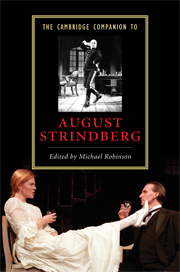Book contents
- Frontmatter
- Part I: Strindberg in context
- Part II: The works
- 3 Learning to speak: Strindberg and the novel
- 4 Between realism and modernism: the modernity of Strindberg’s autobiographical writings
- 5 Miss Julie: naturalism, ‘The Battle of the Brains’ and sexual desire
- 6 Strindberg and comedy
- 7 Crisis and change: Strindberg the unconscious modernist
- 8 A modernist dramaturgy
- 9 The Chamber Plays
- 10 The history plays
- Part III: Performance and legacy
- Bibliography
- Index
6 - Strindberg and comedy
from Part II: - The works
Published online by Cambridge University Press: 28 May 2010
- Frontmatter
- Part I: Strindberg in context
- Part II: The works
- 3 Learning to speak: Strindberg and the novel
- 4 Between realism and modernism: the modernity of Strindberg’s autobiographical writings
- 5 Miss Julie: naturalism, ‘The Battle of the Brains’ and sexual desire
- 6 Strindberg and comedy
- 7 Crisis and change: Strindberg the unconscious modernist
- 8 A modernist dramaturgy
- 9 The Chamber Plays
- 10 The history plays
- Part III: Performance and legacy
- Bibliography
- Index
Summary
Introduction
If we are to believe Strindberg himself, the first play he ever wrote was a comedy. The circumstances were somewhat remarkable. After a failed spell as an actor in 1869, he tried to take his life via a dose of opium, but failed at that as well. Upon emerging from his opium dream (or so he claims in The Son of a Servant), he wrote this now-lost play. Only the title remains: A Name-Day Gift. Next (and considering only the dramas) we find several relatively unimportant historical plays, followed by the drama which should have been his breakthrough, Master Olof (1872-6) about a passionate idealist which, despite its author's ambition to follow in Shakespeare's footsteps by mixing high with low, is at a considerable remove from comedy. Nor was it as a writer of comedies that Strindberg wished to become known. He was on the whole somewhat sceptical of the genre. But it was easier to gain acceptance on the contemporary Swedish stage with comedies and, in addition, Strindberg thought that his first wife, Siri von Essen, would find them more congenial to her abilities as an actress. Hence, throughout his career, Strindberg wrote a number of plays that he designated 'comedies', including The Secret of the Guild (1880), Playing with Fire (1892) and Crimes and Crimes (1899). The two last are among Strindberg's most frequently produced plays, and for that reason alone merit consideration here.
- Type
- Chapter
- Information
- The Cambridge Companion to August Strindberg , pp. 70 - 78Publisher: Cambridge University PressPrint publication year: 2009

